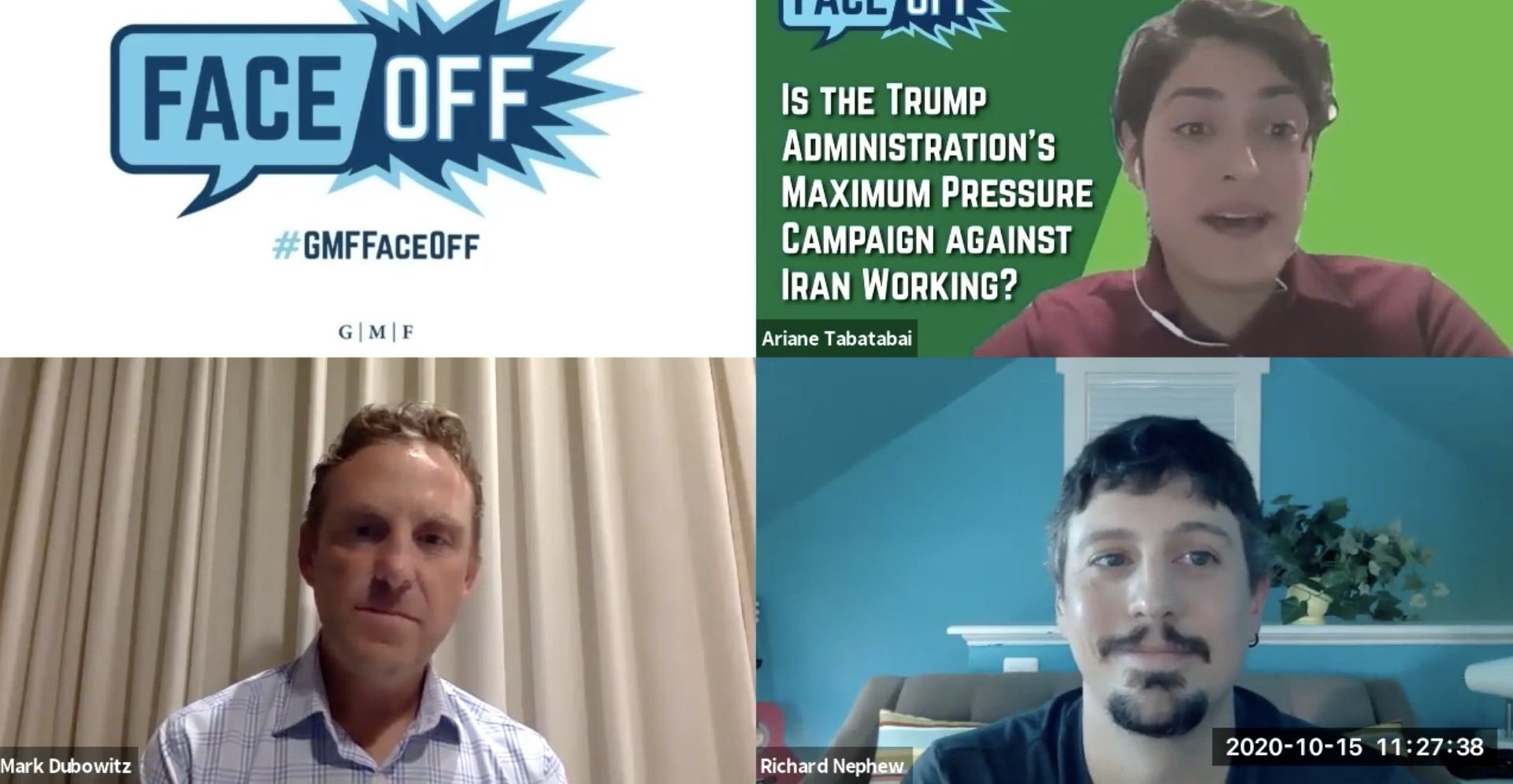An obscure but important controversy erupted recently within the foreign policy community in the nation’s capital about whether a former Obama administration official should have participated in a “debate” with the leader of a DC think tank that has been engaged in lying and online harassment of critics while pushing for war and regime change in Tehran for more than a decade.
The “debate ” — between Columbia University’s Richard Nephew (the former Obama official) and Foundation for Defense of Democracies CEO Mark Dubowitz — took place last week with an unusual format, with each participant tasked with arguing in favor of the other’s position regarding the utility of President Trump’s “maximum pressure” policy of withdrawing from the nuclear deal and imposing crushing sanctions on Iran.
Many of Nephew’s fellow JCPOA proponents criticized him for participating. But Nephew — who was part of the Obama administration’s team that negotiated the Iran deal — defended himself, saying that this was largely a personal quest to understand more fully JCPOA opponents’ thinking and arguments, those he himself admitted he has “glossed more than read.”
“That is a terrible way to proceed,” he said in an article posted on Medium. “It stunts my own intellectual development and growth, and it means that rather than debate fairly on the merits of the case I have read, I debate on what I ‘know’ they think.”
Ultimately, Nephew said, he agreed to participate in the debate with Dubowitz because he found that their spats on Twitter about the issue didn’t accomplish much. “[I]t is my responsibility as a citizen, as a scholar, and as a policy advocate to take seriously the free exchange of ideas,” he concluded.
Nephew is correct, of course, and he should be commended for pursuing this kind of personal intellectual growth. But the controversy surrounding his participation wasn’t about the merits of debate, nor even whether one should engage with someone who holds an opposing viewpoint. Most everyone probably agrees that there are merits to such intellectual exercises.
The real issue here — which Nephew did not address in his defense — is that events like these serve to elevate and legitimize a known bad-faith actor, thereby undermining efforts by the JCPOA’s proponents to point this out to neutral arbiters — mainly the press and some on Capitol Hill and beyond — of the Iran issue and U.S. foreign policy more generally.
Indeed, Dubowitz is not a policy scholar or expert on Iran. He is primarily a political operative almost exclusively devoted to fomenting regime change in Iran by any means necessary, a devotion that he tends to conceal, seemingly because U.S.-led regime change operations have lost their luster not only with the American public but also the DC policy community.
Dubowitz emerged as one of the leading critics of Obama’s diplomacy with Iran and even worked on a plan — a full year before the nuclear deal was even reached — “for Congress to unravel any potential agreement after the ink was dry.”
After the deal was reached, he often lied about and mischaracterized it, falsely claiming it gave Iran “pathways to a nuclear weapon” or that it didn’t change Iranian behavior on other issues outside the purview of the nuclear file (which of course it was never intended to do). He also promoted ridiculous claims that Obama had given Iran stacks of cash and gold worth billions of dollars as part of the agreement.
Then, when Donald Trump became president, he co-authored a memo to the White House pushing “a strategy of coerced democratization” in Iran (i.e. regime change) and was later called out for lying about actually wanting to save the nuclear agreement after Trump withdrew (note that Dubowitz hasn’t been all that vocal about “fixing” the deal now that Trump’s “maximum pressure” policy — one that FDD helped create — is in place).
Under Dubowitz’s leadership, FDD has also not only promoted war with Iran, but its staff members are also regularly engaged in online harassment campaigns against critics of Trump’s Middle East policy, and FDD staffers try to destroy the careers of those with whom they disagree.
It’s for these reasons that I and many other supporters of the JCPOA and diplomacy with Iran (or just those who want to have good-faith debates on foreign policy) have taken up the cause — to some positive effect — of alerting prominent reporters who quote or cite Dubowitz that he is a bad-faith actor who has no credibility and should not be taken seriously.
So, again, full and fair debates, particularly with those who hold opposing views, are always welcome. But an honest discussion about U.S. Iran policy with Dubowitz is not possible, and it only serves to undermine the cause of informing those responsible for covering and explaining these complex issues just who he really is.
Indeed, it turns out — shockingly to no one — that Dubowitz took on the whole exercise in bad faith. Rather than taking Nephew’s side, i.e. against “maximum pressure” through the lens of being supportive of the JCPOA, Dubowitz argued that Trump’s Iran policy hasn’t been hawkish enough, ignoring, of course, that it has only served to strengthen Iranian hardliners both at home and abroad, and to eliminate the guardrails on Iran’s nuclear program that the Obama administration had so painstakingly worked to construct.
The reality is that this kind of legitimizing exercise only validates Dubowitz’s deception of pursuing regime change and war under the guise of seeking a better nuclear deal, while at the same time elevating an organization that uses harassment as an organizing principle.
















